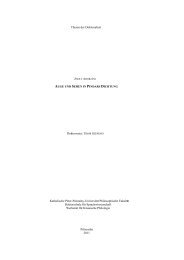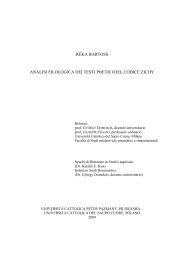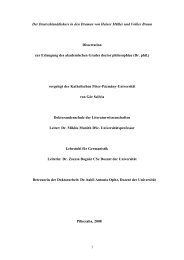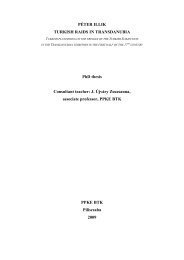tézisfüzet angol - Index of - Pázmány Péter Katolikus Egyetem
tézisfüzet angol - Index of - Pázmány Péter Katolikus Egyetem
tézisfüzet angol - Index of - Pázmány Péter Katolikus Egyetem
Create successful ePaper yourself
Turn your PDF publications into a flip-book with our unique Google optimized e-Paper software.
life one or the other <strong>of</strong> them was primary for him, according to the environment;<br />
besides these four “main” languages, however, he acquired Greek, Hebrew,<br />
Polish and presumably Czech, and he had some knowledge <strong>of</strong> Italian, French,<br />
Syriac and Russian. He kept his diary in Latin, but there are some Hungarian and<br />
German poems and Greek, Hebrew, Slovakian, German, Hungarian and Polish<br />
words and expressions in it. He <strong>of</strong>ten mixes languages in the use <strong>of</strong> names in the<br />
diary. The Evangelical intellectuals in North Hungary had a strong sense <strong>of</strong><br />
Hungarus-consciousness, Buchholtz’s notes also reflect his interest in the history<br />
<strong>of</strong> Hungary and anxiety about his homeland’s fate. Not once does he talk about<br />
the Hungarian language with other people, but some references in the diary show<br />
that he does not consider it more important than the other languages <strong>of</strong> the<br />
country.<br />
Beyond introducing and analyzing the content and the formal characters<br />
<strong>of</strong> the diary and presenting its new data for cultural history, I tried to answer the<br />
question to what extent Buchholtz’s diary suits the requirements <strong>of</strong> its genre. As<br />
regards form and order <strong>of</strong> everyday notes, it is just as a diary “has to be” by the<br />
technical literature, the topics in it are not extraordinary, either; it is special due to<br />
its great extent and informativeness. The usual points <strong>of</strong> examination, mentioned<br />
at the beginning <strong>of</strong> this dissertation in the chapter on diaries in general, are<br />
relevant for Buchholtz’s notes, the consequences, however, are quite different<br />
from those in the theoretical writings. This work cannot be classified as a clear<br />
example <strong>of</strong> a certain diary type; and among its motifs only a few can be<br />
discovered out <strong>of</strong> those emphasized by the technical literature, e. g. memory,<br />
manifesting religiousness, partly family model and account, but there are no<br />
traces <strong>of</strong> self-examination, self-justification, self-defence, confession. It hardly<br />
reflects personal feelings, emotions or opinions, it is not subjective. Nothing<br />
refers to any intention by Buchholtz to write it for his descendants or anyone else<br />
to read or publish, neither that he used it as a source material. As regards<br />
10






